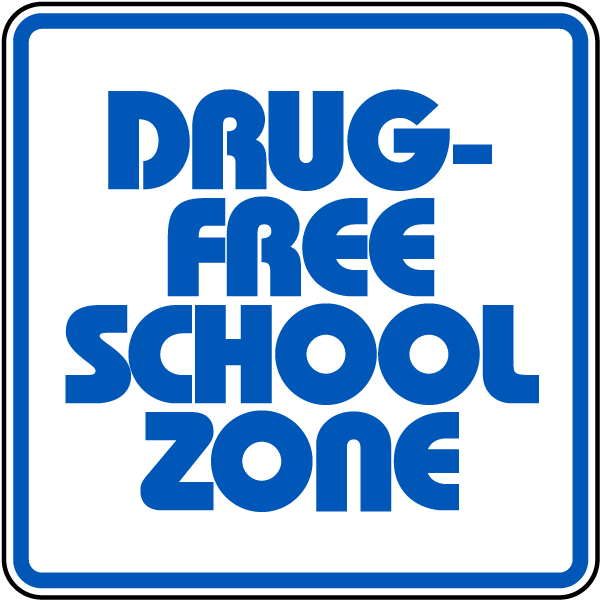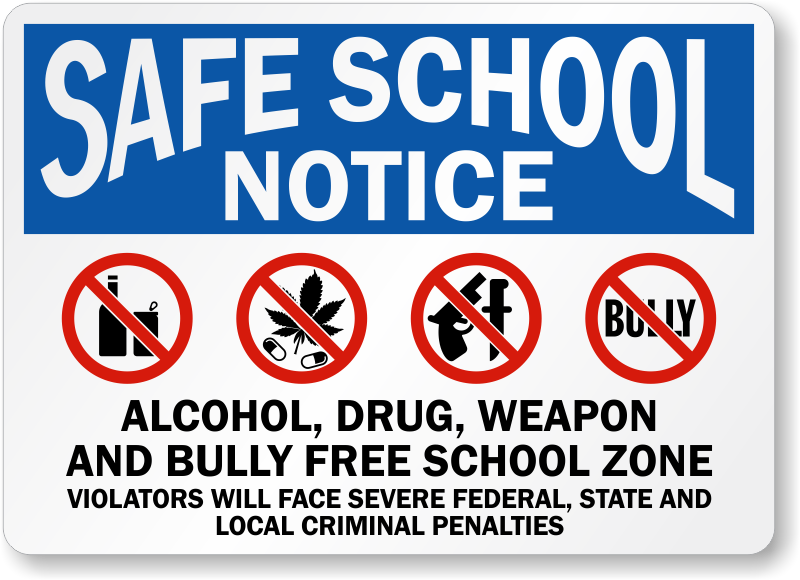
As the physical, social, and psychological “home away from home” for most youth, schools naturally assume a primary role in substance abuse education, prevention, and early identification.
What is a safe and "Drug Free School?"
The purpose of the Safe and Drug Free Schools and Communities Act is to support programs that prevent violence in and around schools; that prevent the illegal use of alcohol, tobacco, and other drugs; that involve parents and communities; and that are coordinated with related federal, state, school, and community efforts and resources to foster a safe and drug-free learning environment that supports student academic achievement.
The Georgia Department of Education administers the program and funds shall be used to develop, implement, and evaluate comprehensive programs and activities, which are coordinated with other school and community-based services and programs. Such program or activity developed must meet the five Principles of Effectiveness, and be scientifically based. Schools receiving funds under this act are required to report the information required for the uniform management information and reporting system.
What are Safe and Drug-Free Schools Authorized Activities?
- Dissemination of drug and violence prevention information to schools and the community to develop awareness and knowledge of the nature and extent of alcohol, tobacco, and other drug use, abuse, and addiction, and their effects on individuals, families, and communities.
- Professional development and training for, and involvement of, school personnel, pupil services personnel, parents, and interested community members in prevention, education, early identification and intervention, mentoring, or rehabilitation referral, as related to drug and violence prevention.
- Drug and violence prevention activities may include the following:
- Community-wide planning and organization - to reduce violence and illegal drug use, which may include gang activity prevention.
- Conflict resolution/peer mediation programs - implementation of programs intended to affect critical life skills, knowledge, attitudes, and skills in resolving conflict without violence, including programs that train peer mediators and a designated faculty supervisor, and youth led anti-crime and anti-drug councils and activities
- Alternative education programs or services for violent or drug abusing students that reduce the need for suspension or expulsion or that serve students who have been suspended or expelled from the regular educational setting, including programs or services to assist students to make continued progress toward meeting the State academic achievement standards and to reenter the regular educational setting.
- Expanded and improved school-based mental health services related to illegal drug use and violence, including early identification of violence and illegal drug use, assessment, and direct or group counseling services provided to students, parents, families, and school personnel by qualified school-based mental health services.
- Counseling, mentoring, referral services, and other student assistance practices and programs, including assistance provided by qualified school-based mental health services providers in appropriate identification and intervention techniques for students at risk of violent behavior and illegal alcohol, tobacco, and drug use.
- Mentoring programs that encourage students to seek advice from, and to confide in a trusted adult regarding concerns about violence and illegal drug use.
- Truancy reduction programs - drug and violence prevention activities designed to reduce truancy.
- Student harassment programs - age-appropriate, developmentally-based violence prevention and education programs that address victimization associated with prejudice and intolerance, and that include activities designed to help students develop a sense of individual responsibility and respect for the rights of others, and to resolve conflicts without violence.
- Locker searches - a student’s locker may be inspected for weapons, illegal drugs, or drug paraphernalia.
- Drug testing - consistent with the fourth amendment to the Constitution of the United States, students may be tested for illegal drug use (including at the request of or with the consent of a parent or legal guardian of the student, if the local educational agency elects to so test or inspect).
- Emergency intervention services following traumatic crisis events, such as a shooting, major accident, or a drug-related incident that have disrupted the learning environment.
- Establishing or implementing a system for transferring suspension and expulsion records, consistent with Section 444 of the General Education Provisions Act (20 USC 1232g), by a local educational agency to any public or private elementary school or secondary school.
- Character education - developing and implementing character education programs, as a component of drug and violence prevention programs that take into account the views of the parents of the students for whom the program is intended.
- School safety hotline - developing and maintaining a school safety hotline.
- Community service - pertains to activities conducted by students to benefit the larger community and encourage students to lead drug/violence-free lives or increase students’ sense of community. These activities may include service learning.
- Employee background checks - conducting a nationwide background check of each local educational agency employee, regardless of when hired, and prospective employees for the purpose of determining whether the employee or prospective employee has been convicted of a crime that bears upon the employee’s fitness
- to be responsible for the safety or well-being of children.
- to serve in the particular capacity in which the employee or prospective employee is or will be employed.
- to otherwise be employed by the local educational agency.
- Early warning signs training - programs to train school personnel to identify warning signs of youth suicide and to create an action plan to help youth at risk of suicide.
- Domestic/child abuse programs - programs that respond to the needs of students who are faced with domestic violence or child abuse.
4. Security Measures may include the following:
- Security equipment - acquiring and installing metal detectors, electronic locks, surveillance cameras, or other related equipment and technologies.
- Reporting criminal offenses committed on school property.
- School security plans - developing and implementing comprehensive school security plans or obtaining technical assistance concerning such plans, which may include obtaining a security assessment or assistance from, the Georgia Emergency Management Agency (GEMA), the School Security and Technology Resource Center at the Sandia National Laboratory located in Albuquerque, New Mexico, or others as applicable.
- Safe zones of passage - activities that ensure students travel safety to and from school, which may include bicycle and pedestrian safety programs.
- Hiring and training of school security personnel - hiring and training based on scientific research, of school security personnel (including school resource officers) who interact with students in support of youth drug and violence prevention activities.
Drug Free Schools and Communities Act - Georgia Colleges
As part of the Drug-Free Schools and Communities Act Amendments of 1989, Georgia College & State University (GC) is required by law to provide to every employee and each student who is taking one or more classes, written materials that adequately describe and contain the following information:
- Standards of conduct that prohibit unlawful possession or distribution of drugs and alcohol.
- A clear statement of disciplinary sanctions that the institution will impose on students and employees.
- A description of applicable counseling, treatment, or rehabilitation programs offered.
- A description of health risks associated with the use and abuse of drugs and alcohol.
- A description of applicable legal sanctions under local, state or federal law.
Georgia Program Administration
Name:
Department:
Telephone:
Fax:
Email:
Program URL:
Marilyn O. Watson - Program Manager
Georgia Department of Education
(404) 651-7179
(404) 463-0441
mawatson@doe.k12.ga.us
Name:
Department:
Telephone:
Email:
Jeff Hodges - Program Specialist
Georgia Department of Education
(404) 463-7891
jhodges@doe.k12.ga.us
Can Schools and Colleges Become a Drug Free Workplace?
For more information and answers to questions that you may have related to State Drug Free Workplace Certifications please contact Chuck Wade, the State Director of the Drugs Don't Work in Georgia Program Director, at cwade@livedrugfree.org.
Drug Free Workplace Requirements
The Georgia State Board of Workers' Compensation certifies employers as a drug-free workplace. Those certified receive a 7.5% reduction of their workers' compensation premiums. Employer must submit a copy of their certificate each year to their carrier in order to receive the discount. (O.C.G.A. §33-9-40.2) (O.C.G.A. §34-9-412)

A written policy - Code Section 34-9-414
Organizations must have a substance abuse policy that meets the requirements of GA law.

Access to assistance - Code Section 34-9-416
List of treatment and counseling centers or proof of (EAP) Employee Assistance Program which may be a part of your company health insurance plan.

Employee education - Code Section 34-9-417
Copy of monthly Employee Drug Education Newsletters, or a copy of sign-in sheet from in-person training or DVD training.

Supervisor training - Code Section 34-9-418
Copy of monthly Supervisor Training Newsletters, or a copy of sign-in sheet from in-person training or DVD training.

Drug testing - Code Section 34-9-415
A receipt from the drug testing administrator will be sufficient. Results of all drug tests must be kept confidential.
Maintaining these five requirements annually can be a daunting task for companies large and small. The good news is there are excellent programs that can be easily implemented and will help your company to maintain your drug free workplace program.
Transform your school into a safe and drug free environment for your staff and students by becoming a Drug Free Workplace Today!
*Drug Free Workplace Program recipients receive a 7.5% Discount on Workers' Comp! Self -Insured companies receive the same 7.5% discount off their state assessment fees!. Georgia State and Federal contract and grant recipients must maintain a Drug Free Workplace.
Ten Alcohol Prevention Tips For Youth



